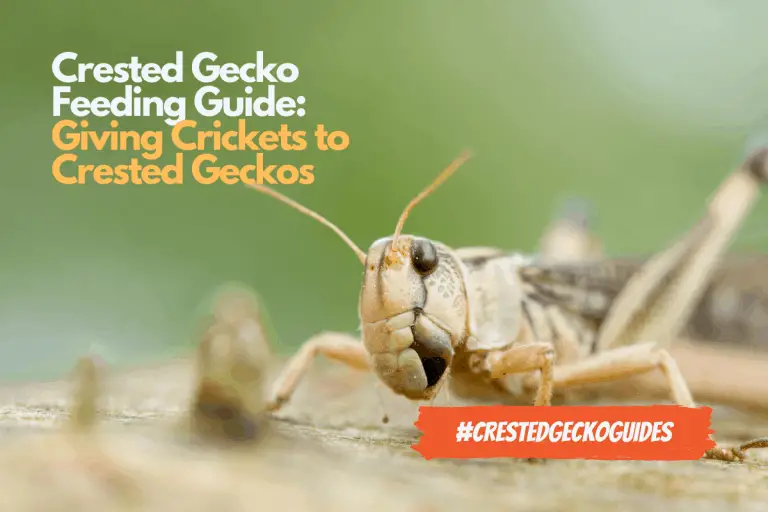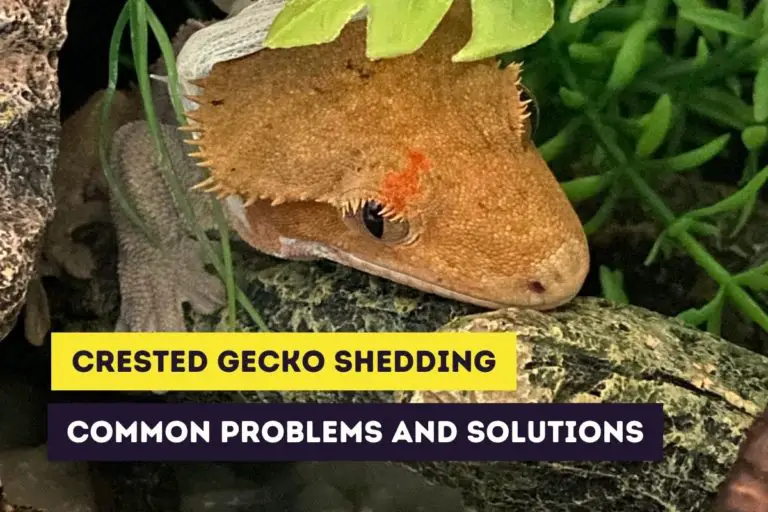Can Crested Geckos Swim? (Do They Like Water)
Estimated reading time: 5 minutes
Crested geckos are (semi-)arboreal and live in an environment that has relatively high humidity. You might be tempted to try to let your crested gecko take a swim or to bathe it. But is this a good idea or should it be avoided at all costs? Can crested geckos swim?
Crested geckos, like all lizards, can swim as an intuitive ability. They will only swim in cases where there is no other option. Swimming is a stressful activity for crested geckos who won’t like it. It’s best to keep your crestie away from water, except for the water bowl and misting.
A crested gecko is used to humidity but isn’t used to getting in a body of water. Since crested geckos stay and live most of their lives in the plants and trees, they will only seldom contact a larger pool of water. They also don’t need to come in contact with a lot of water because they got a particular way of keeping themselves clean.
If you’re interested in stickers or other products of crested geckos, you can always visit our Etsy Shop, which is called Artful Animalia. We currently only send stickers in the United States. If you’re interested in certain crested gecko-related products, don’t hesitate to contact us.
In this article, you’ll learn where the swimming ability of a crested gecko comes from and if it’s good at it. You’ll learn why it’s best not to force your crested gecko into the water and why you don’t have to bathe a crestie.
This site contains affiliate links to products we recommend and use ourselves. We may receive a commission for purchases that you make through these links. If you’re interested in learning more about our affiliate links, please visit our (affiliate) disclaimer.
Crested Geckos & Swimming
The ability of crested geckos to swim
Crested geckos are lizards and more in general reptiles. All lizards are capable of swimming and it’s a form of instinct that’s been there since birth. This instinctive ability is most often used when in danger. Think of a crested gecko near a small pool of water and being chased by a predator. The crested gecko can get into the water and cross it to (try to) evade its chaser.
The swimming of the gecko is similar to its natural movement, a bit of sideways movement. Although a crested gecko can swim they will try to get out of the water as fast as possible and find a safe spot in the vicinity.
Crested geckos don’t have gills and have to hold their breath while underwater. But most cresties won’t try to dive. They will try to stay afloat and swim to the shore. When they don’t have any option and get underwater, they’ll hold their breath for a short time. When they aren’t able to get above water they will drown.
How do crested geckos swim?
As I already mentioned, the swimming movement of a crested gecko is similar to its natural movement on the land and trees. They can also use their tails for propelling a bit more in the water. Crested geckos are quite good at swimming but won’t win any prizes as a fast or elegant swimmer, as other more aquatic reptiles would. They’re more practical and instinctive swimmers.
Why you shouldn’t force your crested gecko to swim
Crested geckos aren’t aquatic reptiles and are, in fact, the contrary – being arboreal. They won’t like swimming and when you force them to swim, it is a bad experience. So, forcing a crested gecko to swim will possibly lead to:
- stress and perhaps a tail loss,
- in severe cases: drowning and death of your crested gecko,
- a distrust from your gecko towards you (will not help with bonding)
So there are a lot of dangers and no benefits from letting a crested gecko swim. In my honest opinion, there’s not one single reason you would need to put a crested gecko in a body of water.
Bathing a Crested Gecko
Some crested gecko owners might be tempted to bathe their pets, just like other pets. But crested geckos don’t need bathing or soaking in most cases. A young crested gecko will shed more often than an adult. But even adult crested geckos will shed their skin once a month. This process helps their skin stay clean and removes any filth or debris.
In some rare cases, it might be helpful to bathe your crested gecko. This is not done by placing your gecko in a real bath but by letting it soak in a humid container with a damp paper towel. Leave your crestie in it for about 15 minutes (make sure that the container has air holes). Afterward, use a q-tip to clean any dirt or remove shed that didn’t come off.
Related Questions
Can a crested gecko get wet?
Crested geckos need to have humidity between 50 and 80 percent in their vivarium. For hatchlings and juveniles, high humidity is more important but in general, humidity keeps your gecko well-hydrated. Besides that, it helps with shedding. So crested geckos can get wet and don’t have any problem with that. When the humidity is too high for a long time, for example is 90 percent the entire day, they will become uncomfortable.
What kind of water do crested geckos need?
You should always use water that’s approved for human use. This can be tap water but this kind of water is often chlorinated. Most animals won’t have any problem drinking this chlorinated water. If you want to be safe, you can give filtered tap water or even distilled water. Never use water from a garden hose because this can contain bad elements.
Want to Learn More?
If you want to learn more about crested geckos as pets, please read the following articles.
If you’re interested in getting crested geckos as pets you should also definitely read our article about baby and juvenile crested gecko care or (adult) crested gecko care.







